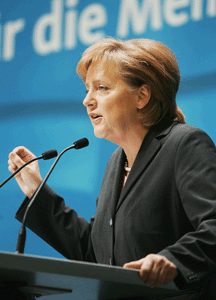EU Nations Agree to Closer Integration
Friday, December 9th, 2011Dec. 9, 2011
European Union (EU) leaders, meeting in Brussels, Belgium, have agreed to a pact that requires member nations to enforce stricter fiscal (public finance) discipline in their national budgets. In the future, financial officials of member nations will submit tax and spending plans to EU officials for their approval before showing budgets to their government. The accord includes penalties for breaking deficit limits. (A deficit is the amount by which a sum of money falls short.) The actions were taken in response to the current eurozone debt crisis. (The eurozone consists of the 17 member countries of the European Union that have adopted the euro as their single currency.) Investors worldwide fear that Greece, Ireland, Italy, Portugal, and Spain could default (fail to pay when due) on their national debts–that is, their government bonds. A default by Italy, Europe’s third-largest economy, could throw economies around the world into recession if not depression.
The EU leaders also agreed to provide an additional $200 billion ($268 billion) to the International Monetary Fund to shore up the European bailout fund to cover Italy and Spain through the current debt crisis. A permanent $500-billion ($670-billion) European Stability Mechanism will be put into effect by July 2012, which will run concurrently with the existing $440-billion ($590-billion) European Financial Stability Facility. The new rules on spending and budgets will not be implemented by an EU treaty but by an intergovernmental treaty, which will likely be more easily ratified (approved) by individual countries.

German Chancellor Angela Merkel, along with French President Nicholas Sarkozy, served as architects of the plan to impose fiscal discipline on eurozone countries. © Sean Gallup, Getty Images
Efforts to reach unanimity (complete agreement) among the 27 EU member nations, as desired by German Chancellor Angela Merkel, failed. British Prime Minister David Cameron insisted that the United Kingdom be exempted from certain financial regulations. Analysts see his objections chiefly as a means to protect “the city of London,” that is, Britain’s highly important banking and financial services sector. International affairs experts noted that while Europe is taking a big step towards closer integration, the United Kingdom appears to be isolating itself, limiting its influence on the future course of events.
Additional World Book articles


